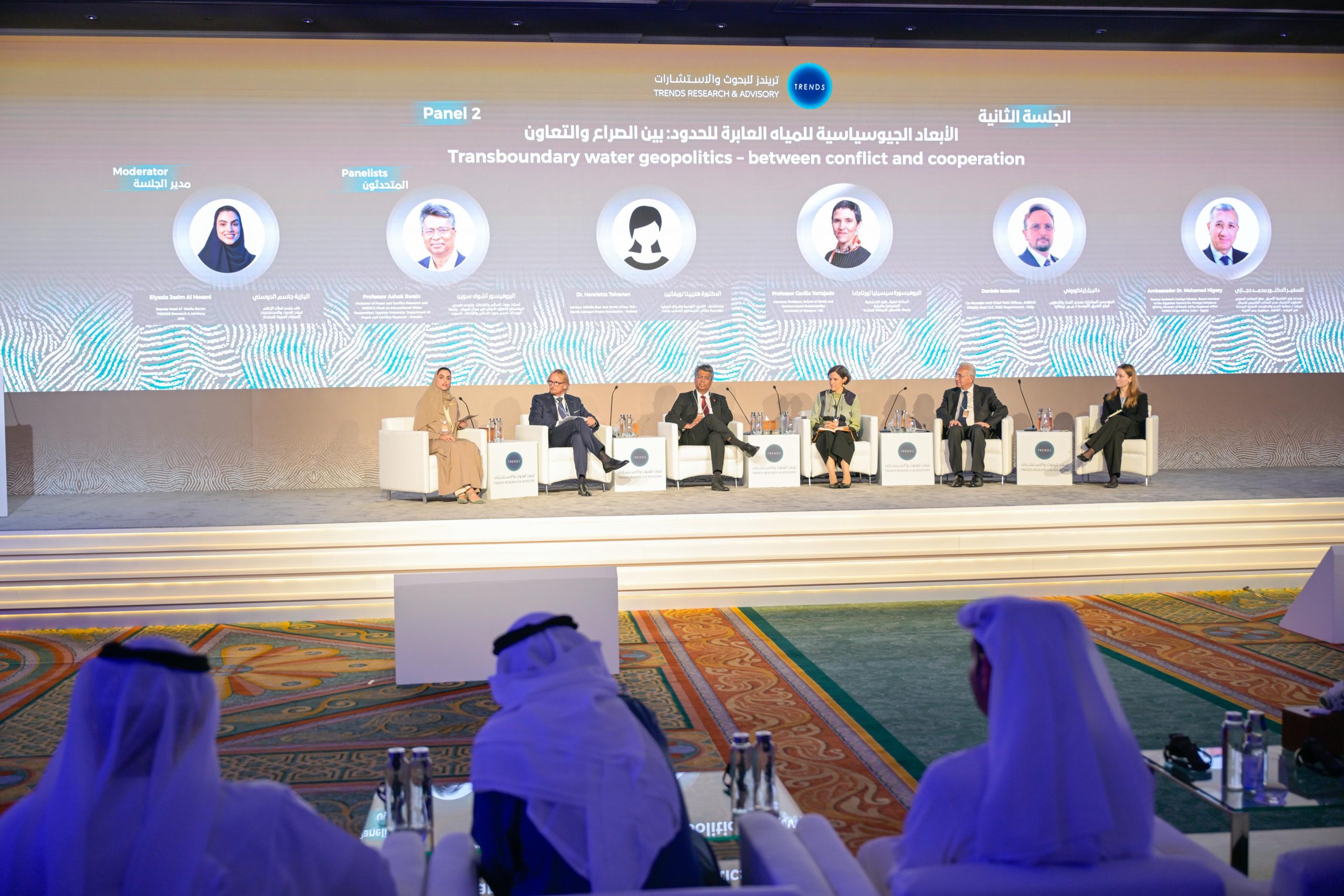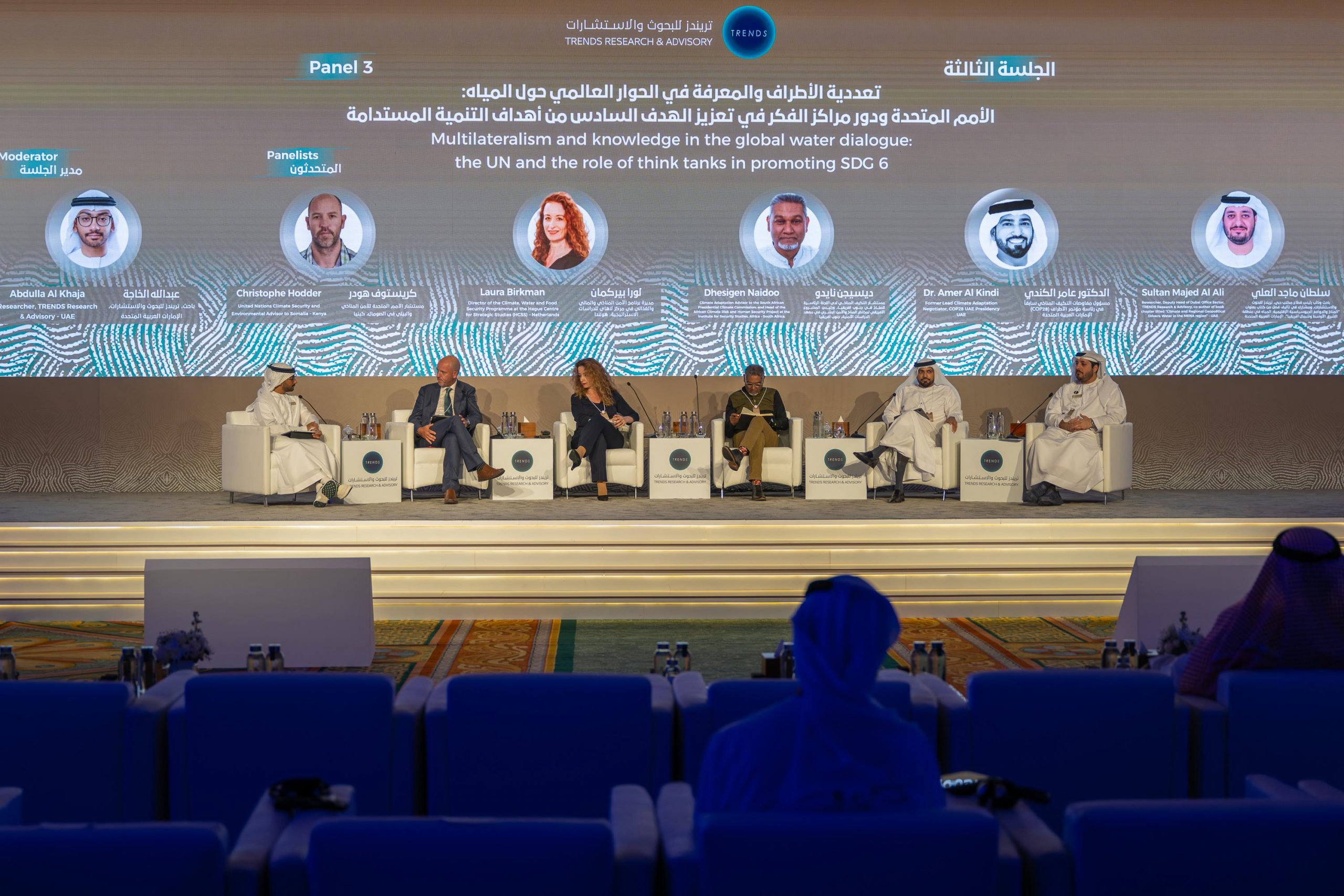-Day One sessions highlight geopolitical challenges, technological opportunities, and the role of think tanks in advancing SDG 6
On the first day of TRENDS Research & Advisory’s Fifth Conference on Sustainable Water Security, three main sessions discussed the challenges and opportunities related to water resource management at the regional and global levels.
Session One: Shaping Water Security
Abdulaziz Al-Shehhi, Senior Researcher and Deputy Head of the Research Sector at TRENDS Research & Advisory, moderated the first session, Shaping the Future of Water Security.
Participants included Rt. Hon. Sir Liam Fox, former UK Secretary of State for Defense, UK Abraham Accords Group Chairman, and author of The Coming Storm: Why Water Will Write the 21st Century. In his remarks, he focused on several key themes, including: water security as the most significant global challenge of the 21st century, due to its direct impact on food security and economic stability; the close link between water and energy, and the role of innovation and technology in addressing resource scarcity; and a warning that future conflicts are more likely to arise over water than any other resource, underscoring the need to build sustainable regional and international frameworks for cooperation. He emphasized that investment in innovative water management solutions is a cornerstone for achieving sustainable development and protecting future generations.

H.E. Professor Ahmed Ali Al-Raeesi, Acting Vice Chancellor of UAE University, presented an integrated vision of water security priorities, stressing that the prosperity of nations depends on both the quantity and quality of water resources, which must be safeguarded for current and future generations. He highlighted three key areas: first, agriculture, the world’s largest consumer of water (over 70% of total consumption). He emphasized the need to reduce waste, adopt modern and efficient irrigation systems, and avoid cultivating water-intensive crops. Second, domestic consumption. He noted that per capita water use in the GCC averages 650 liters per day compared to just 150–250 liters in Europe. He underlined the importance of behavioral change, water-saving policies, and the installation of conservation devices. Third, treated water and rainwater harvesting are renewable resources that can be utilized in agriculture and green landscaping. This is vital in enhancing water security in arid and semi-arid regions.

Ayesha Al Ateeqi, Executive Director of the Mohamed bin Zayed Water Initiative, stated this year’s TRENDS Annual Conference on Sustainable Water Security was an invaluable platform to advance dialogue on water’s vital role in securing global stability and resilience. “The discussions emphasized the urgency of accelerating innovation for scalable solutions and ensuring they reach the communities most in need. Equally important is fostering inclusive, cross-sector partnerships that unite governments, the private sector, investors, philanthropies, and civil society – leaving no one behind, particularly vulnerable groups most affected by water scarcity. Water should be treated not only as an environmental concern but as central to economic stability, food security, and peace, and integrated into long-term resilience strategies at all levels.”

Session Two: The Geopolitical Dimensions
The second session — Transboundary water geopolitics: Between conflict and cooperation —was moderated by Elyazia Jassim Al-Hosani, Researcher and Deputy Head of Administration and Media Sector at TRENDS.
It featured an in-depth discussion by a panel of international experts focusing on the challenges of major rivers crossing multiple borders, and the resulting geopolitical tensions, which could escalate into conflicts or be managed through fair and sustainable cooperation mechanisms.
Prof. Ashok Swain, Professor of Peace and Conflict Research and UNESCO Chair on International Water Cooperation at Uppsala University, stressed the need for a comprehensive review of transboundary water agreements to ensure flexible distribution and climate adaptation. He highlighted strengthening river-basin institutions with capabilities for data sharing, early warning, and conflict resolution. He also reinforced water diplomacy through third-party mediation, Track II diplomacy, and investment in climate adaptation and water-efficient technologies in fragile areas.
Dr. Henrietta Toivanen, Advisor on MENA Affairs at the Martti Ahtisaari Peace Foundation, emphasized adopting multi-disciplinary, cross-sectoral approaches for long-term solutions. She called for embedding justice and equity into water-sharing arrangements to prevent power imbalances, institutionalizing cooperation platforms such as joint committees and monitoring mechanisms, and using foresight tools and scenario planning to address rapid environmental and climate shifts.
Prof. Cecilia Tortajada, an Honorary Professor at the School of Social and Environmental Sustainability at the University of Glasgow, presented an integrated framework for adaptive water governance that considers the water-food-energy-environment nexus and builds on successful global practices. She underscored the importance of advancing the circular water economy through reuse, desalination, and artificial groundwater recharge, combining engineered and nature-based solutions to manage floods, droughts, and environmental shocks.

Daniel Iacoboni, Co-Founder and Director of R&D at ANECO Middle East, highlighted integrating sustainable technologies into water security systems, particularly through local production of hypochlorous acid (HOCl) using simple means (water, salt, and electricity), which strengthens public health and community resilience. He also called for common cross-border sanitation standards and linking technological innovation with preventive diplomacy to enhance peace and stability.
Ambassador Dr. Mohamed Higazy, former Egyptian Assistant Foreign Minister and member of the Egyptian Council for Foreign Affairs, stressed that water cooperation could drive regional integration if founded on principles of equitable use and strong basin institutions. He emphasized that water issues go beyond resource sharing as an entry point for building trust, peace, climate resilience, and economic integration.
The session concluded with practical recommendations, calling for strengthening transboundary cooperation through adaptive governance frameworks, joint monitoring and data exchange mechanisms, and foresight-based strategies to ensure equitable and sustainable management of shared waters, turning rivers from tension flashpoints into cooperation and development engines.
Session Three: Multilateralism and Knowledge in the Global Water Dialogue
The third and final session of Day One —Multilateralism and Knowledge in the Global Water Dialogue: The UN and the Role of Think Tanks in Promoting SDG 6 — was moderated by Abdulla Al-Khaja, Researcher at TRENDS Research & Advisory. It highlighted the central role of the United Nations and its agencies in leading multilateral diplomacy for sustainable water and sanitation management, along with the contribution of think tanks in supporting policymakers and developing technical and scientific knowledge.
Christoph Hodder, United Nations Climate Security and Environmental Advisor to Somalia, stressed that water security is essential for development, peace, and stability. He warned that the lack of reliable access to safe water in fragile states drives conflict and displacement. He noted that partnerships between the UN and think tanks help transform knowledge into actionable policies by integrating water security into climate and peace agendas, expanding access to international financing for innovation and sustainable solutions.
Dhesigen Naidoo, Climate Adaptation Advisor to the South African Presidential Climate Commission and Head of the African Climate Risk and Human Security Project at the Institute for Security Studies, Africa (South Africa), provided an in-depth analysis of climate change’s impact on African water security. He examined the links between climate risks and water resource management, stressing the need to integrate climate adaptation strategies into national and regional policies to ensure water sustainability and protect vulnerable communities. He highlighted the role of think tanks and research institutions in offering innovative solutions and enriching multilateral dialogue on sustainable water policies, noting how African experiences can serve as a model in leveraging scientific knowledge to advance the water-related Sustainable Development Goals.
Dr. Amer Al-Kindi, Former Lead Climate Adaptation Negotiator, COP28 UAE Presidency, offered an international perspective on water management, drawing on his extensive experience in global climate negotiations, particularly at COP28. He discussed the role of multilateral cooperation in enhancing states’ ability to confront water scarcity challenges, stressing the importance of partnerships among governments, international agencies, and think tanks in shaping innovative and sustainable policies. He also showcased UAE and global experiences supporting sustainable water projects, underscoring the need to effectively link research knowledge with practical implementation to achieve SDG 6.
Sultan Majed Al-Ali, Deputy Head of Dubai Office Sector, TRENDS Research & Advisory, spoke about the role of think tanks in strengthening the global water dialogue and supporting the achievement of SDG 6. He referred to the “Rule of Three” concept: humans can only survive three minutes without air, three days without water, and three weeks without food. He emphasized that water remains the most vital element in major crises.

He cited global examples such as Hurricane Katrina in the United States and the 2011 Japan Tsunami, both of which exposed the vulnerability of water systems to natural disasters and the importance of planning for resource management. He highlighted key challenges, including water scarcity in the Middle East, water stress in Europe and the UK, and transboundary water agreements.
Al-Ali stressed that think tanks are pivotal in shaping water policies by providing evidence-based knowledge, convening stakeholder dialogues, developing international partnerships, and linking research outcomes with political decisions. He also presented findings from the TRENDS Global Barometer surveys, which reflected growing global awareness of climate change risks and the urgent need to adopt more sustainable water management policies.
The session strongly emphasized that accelerating progress toward SDG 6 (clean water and sanitation for all) requires the joint efforts of governments, international organizations, and think tanks, alongside investment in knowledge, innovation, and modern technologies. The overarching goal is to transform water into a driver of international cooperation and sustainable development, rather than a source of conflict and tension.
The day’s final proceedings commenced with discussions to formulate recommendations and adopt the conference’s outcomes.



